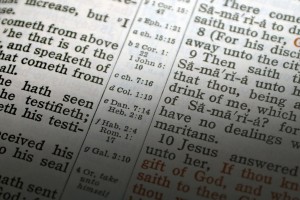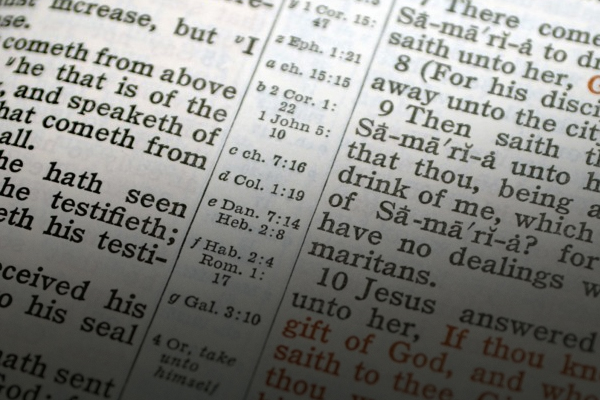
In a similar way, we need to understand what might have been motivating Matthew and Luke as they recorded their genealogies of Jesus. In this regard, I think the scholarship that precedes me has done an excellent job of uncovering two reason contributing factors that might explain the differences:
Minor Reasonable Contributing Factor:
Some theologians and scholars have noted that one of the authors may simply have been more interested in including members of Jesus’ “legal” lineage who are related to him through “levirate marriage”. Back in these days, if a man passed away without any sons, the man’s brother would marry the widow to produce a son who could carry on the original man’s name. The son could then be listed under the genealogy of his natural father or his legal father. This might explain why Joseph is listed as the son of Heli in Luke but the son of Jacob in Matthew. While this may explain some of the differences between genealogies, there are too many variances to trust this minor contributing factor as a comprehensive explanation.
Major Reasonable Contributing Factor:
A more likely contributing factor, in my view, is the difference in the initial objectives of each author. Matthew appears to be writing to a Jewish audience. As a result, he begins his genealogy with characters familiar to Jews of the time (folks like Abraham, Isaac and Jacob) and places the genealogy at the start of his narrative. He quickly tries to connect Jesus to the overarching Jewish history leading up to the New Testament era. Luke, on the other hand, seems to be more interested in a broader audience that includes gentiles. His narrative begins by addressing Theophilus and he quickly connects the story of Jesus to the “days of Herod”. Luke doesn’t even present the genealogy until after he first introduces Mary and the virgin conception of Jesus. For this reason, it is quite likely that Luke may be tracing the genealogy of Jesus through Mary rather than Joseph. This would explain why Luke traces Jesus back through David’s son Nathan (if he is in the line of Mary), while Matthew traces Jesus back through David’s son Solomon (in an effort to track the line of Joseph).
It appears that the earliest students of the gospel authors had access to Matthew and Luke as concurrent accounts. They all quote, reference or allude to passages in both gospels. Share on X
When I examine a cold-case file and see an apparent contradiction penned by a detective without any attempt to resolve the differences between accounts, I have to remind myself that the detective who recorded the statements certainly must have recognized the differences. Why didn’t he try to resolve them at the time of the original investigation? Why didn’t he at least acknowledge the apparent inconsistencies? As it turns out, it’s usually because he understood the different objectives he possessed when conducting the interviews in the first place. To him, there was no apparent contradiction. In a similar way, I think it’s fair for us to ask the same thing of Matthew and Luke. It appears that the earliest students of the gospel authors (Ignatius, Polycarp and Clement) had access to Matthew and Luke as concurrent accounts. They all quote, reference or allude to passages in both gospels. Certainly they must have noticed the apparent contradictions. Why weren’t the differences altered to harmonize the accounts? It may simply be that, like the original detectives in my cold-cases, they understood the original objectives of the authors better than we do today. Once you understand the contributing factors that motivate authors, it’s far easier to understand the unique differences in their texts.

J. Warner Wallace is a Dateline featured Cold-Case Detective, Senior Fellow at the Colson Center for Christian Worldview, Adj. Professor of Christian Apologetics at Talbot School of Theology, Biola University, author of Cold-Case Christianity, God’s Crime Scene, and Forensic Faith, and creator of the Case Makers Academy for kids.
Subscribe to J. Warner’s Daily Email
J. Warner Wallace is a Dateline featured cold-case homicide detective, popular national speaker and best-selling author. He continues to consult on cold-case investigations while serving as a Senior Fellow at the Colson Center for Christian Worldview. He is also an Adj. Professor of Christian Apologetics at Talbot School of Theology, Biola University, and a faculty member at Summit Ministries. He holds a BA in Design (from CSULB), an MA in Architecture (from UCLA), and an MA in Theological Studies (from Gateway Seminary).

































Pingback: Jesus Specifically Said, “I am God” | Cold Case Christianity
Pingback: How Can the Gospels Be Eyewitness Accounts If They Include Things the Writers Didn’t See? | Cold Case Christianity
Pingback: Why Didn’t Luke Include the Deaths of Paul, Peter and James in the Book of Acts? | Cold Case Christianity
Pingback: Investigating Bart Ehrman’s Top Ten Troublesome Bible Verses | Cold Case Christianity
Pingback: Why Didn’t Paul Mention the Virgin Conception? | Cold Case Christianity
Pingback: How Can We Trust the Gospels When the Genealogy of Jesus Is So Different? | THINKAPOLOGETICS.COM
Pingback: Did Jesus Work Miracles as a Child? | Cold Case Christianity
Pingback: How Can We Trust the Gospels When the Genealogies Are So Different? by J. Warner Wallace | Reference Shelf for the Kingdom of God
Pingback: Eight Steps to Investigating the Case for Christianity | Cold Case Christianity
Pingback: Ten Principles When Considering Alleged Bible Contradictions | A disciple's study
Pingback: Midweek Apologetics Roundup - Hope's Reason
Pingback: How Can We Trust the Gospels When the Genealogy of Jesus Is So Different? | TLG Christian News
Pingback: Como Podemos Confiar nos Evangelhos Quando a Genealogia de Jesus é Tão Diferente? – Cosmovisão e Fé
Pingback: LOOKING AT JESUS, THE ALMIGHTY GOD – Bouncing Ball Life